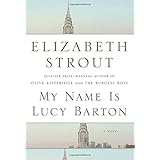
Let me say right up front that I just love Elizabeth Strout. I've had the privilege of meeting her in person right over at the Sanibel Public Library. Her talk is thoughtful, funny, and honest. I suppose it just isn't fair to expect every novel she writes to live up to the Pulitzer Prize winning "Olive Kitteridge," but hope springs eternal. "Burgess Boys" came close.
So what's my problem with "My Name is Lucy Barton?" Reviews have been unanimously positive and we all know that size doesn't matter. After all, look what Kent Haruf did in under 200 pages with "Our Souls at Night." Still, Lucy seemed slight to me. The back story, which should have explained why Lucy is estranged from her family, is so subtle and nuanced that you just might miss it. And certainly the reader is entitled to more information as to how Lucy, an aspiring writer by the way, ended up married to a man so thoughtless and uncaring that he doesn't even come to see her in the hospital when an infection threatens her life.
Instead, he calls Lucy's mother, a woman with whom she hasn't spoken in many, many years. Lucy wakes up from a drug induced sleep to find her mother sitting in a chair in the hospital room. Lucy is both shocked and thrilled. Does this mean that her mother truly does love her after all this time and distance? How can mother and daughter hope to make up for those lost years? Desultory conversation about people from Lucy's past keeps them from alluding to anything of significance in the present.
We learn of Lucy's childhood, years of deprivation both physical and emotional, through flashbacks, and we witness her desperate need for love and approval through the close, but likely one-sided, relationship she develops with her doctor. Lucy is a woman in need of having her memories, her truths, validated by someone, but the only woman who could give her that gift is withholding and dismissive. It's a terribly poignant, difficult book to read and I couldn't help but wonder how much of Strout's own life is being examined here, especially after listening to Strout's interview with Terry Gross a few months ago on Fresh Air. http://n.pr/1Pu4Egb
Sara Nelson, one of my favorite reviewers, now with Amazon, said this about Lucy Barton: "Rarely has a book been louder in its silences." I love that. It seems so right. And just because I felt a little let down after finishing it, doesn't mean that you will. Let me know what your impressions were. I'd love to hear from you - pros and cons.

2 comments:
I gave Lucy Barton one star over on Goodreads. I never clicked with what Strout was trying to accomplish. I was patient at first, waiting for the plot to kick in, but it never did for me. Sara Nelson was correct, about those silences saying much, but they just left me feeling cold. I finally figured out the "plot" was about Lucy's relationship with her mother. The question that remains for me: is it believable that a person who had experienced abuse at the hand of her parents would one day want a loving relationship with one of them? Maybe so. We are each so different and unique, but I found it a stretch, and therefore, could not relate.
Sometimes, a story works better on the screen than in the pages of a book. I loved watching Frances McDormand playing Olive Kitteridge. The screen version brought Olive Kitteridge alive and I appreciated it much more than when I read the book. Maybe one day McDormand will also play Lucy Barton, and then the story will have meaning for me.
What a lovely, thoughtful comment. Thank you so much for taking the time to share your thoughts. I agree with you - maybe I'm cold-hearted but I'm pretty sure I would crave no such reunion with my abusive family. In fact, I would make sure that my real family - the husband and two kids who played such a small role in the book - would be my loving priority.
I, too, loved Frances McDormand as Olive.
Post a Comment